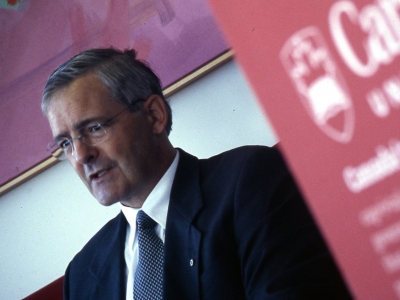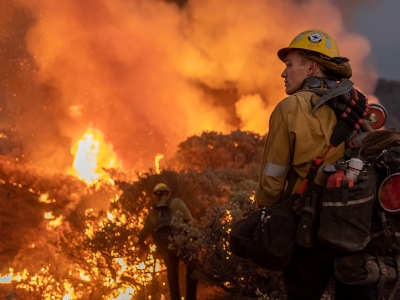Carleton University today conferred an honorary degree on Robert Slater in recognition of his distinguished career in the Public Service of Canada, spearheading initiatives for the protection of the air and water, and inspiring a new generation of Canadians to environmental leadership.
Slater was honoured with a Doctor of Laws during Carleton’s Spring Convocation, where more than 4,800 students are receiving degrees over the course of five days.
In his address, Slater discussed challenges facing society and the skills that will be required to address them, including leadership.
“Leaders bring order to messy situations,” said Slater. “They decide what’s important and what’s not, what has to be done first, the skills that need to be assembled and the approach that needs to be taken. They are trustworthy and they are trusted. They are busy people, but they avoid busy work. They are excellent listeners and permanently curious.”
Slater noted that many of graduating students already have this quality. It is ready to be developed and then applied during their careers.
Slater is an adjunct professor in the School of Public Policy and Administration at Carleton, where he is also executive director of the Regulatory Governance Initiative.
During his 32-year career, he has occupied several senior positions at Environment Canada, including senior assistant deputy minister for eight years.
“So far, his life has had three acts: chemical engineer working on pollution problems, public official helping politicians deliver the most important improvements in Canadian environmental legislation in the last century, and, teacher,” said David Miller, professor in the Department of Chemistry.
He was instrumental in establishing the National Roundtable on the Environment and the Economy, the International Institute for Sustainable Development and the United Nations University Institute for Water, Environment and Health.
He played a lead role in renegotiating the Great Lakes Water Quality Agreement, Acid Rain agreements with provincial governments, the Canada-U.S. Accord on Air Quality, and the Green Plan.
Slater also led preparations for Canada’s role at the UN Conference on the in Rio de Janeiro in 1992. He was responsible for legislative initiatives leading to the Canadian Environmental Protection Act and the Species at Risk Act, and led the development of regulations limiting lead in gasoline and bringing auto emissions standards in line with those in the United States.
He chaired the International Joint Commission’s Great Lakes Water Quality Board from 1976 to 1982.
After he left the public service, he founded a consulting company in sustainable development which operated internationally and was a member of the National Roundtable on the Environment and the Economy for six years. Before joining the public service, he was co-founder of Pollutech, an environmental consulting company.
He was awarded degrees from Imperial College of Science and Technology and was appointed a Member of the Order of Canada in 2009.
Media Contact
Steven Reid
Media Relations Officer
Carleton University
613-520-2600, ext. 8718
613-265-6613
Steven_Reid3@Carleton.ca
Carleton Newsroom: https://newsroom.carleton.ca/
Follow us on Twitter: www.twitter.com/Cunewsroom
Need an expert? Go to: www.carleton.ca/newsroom/experts
Wednesday, June 12, 2019 in News Releases
Share: Twitter, Facebook



